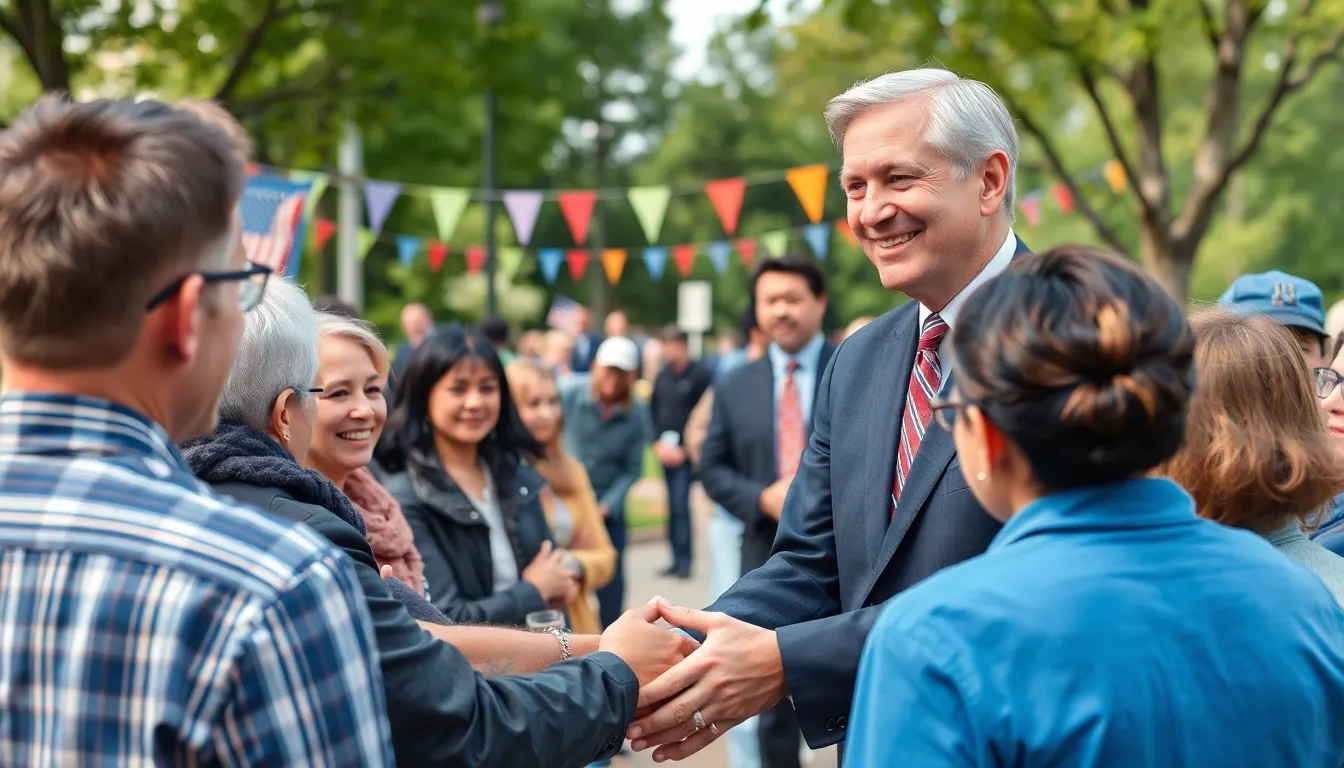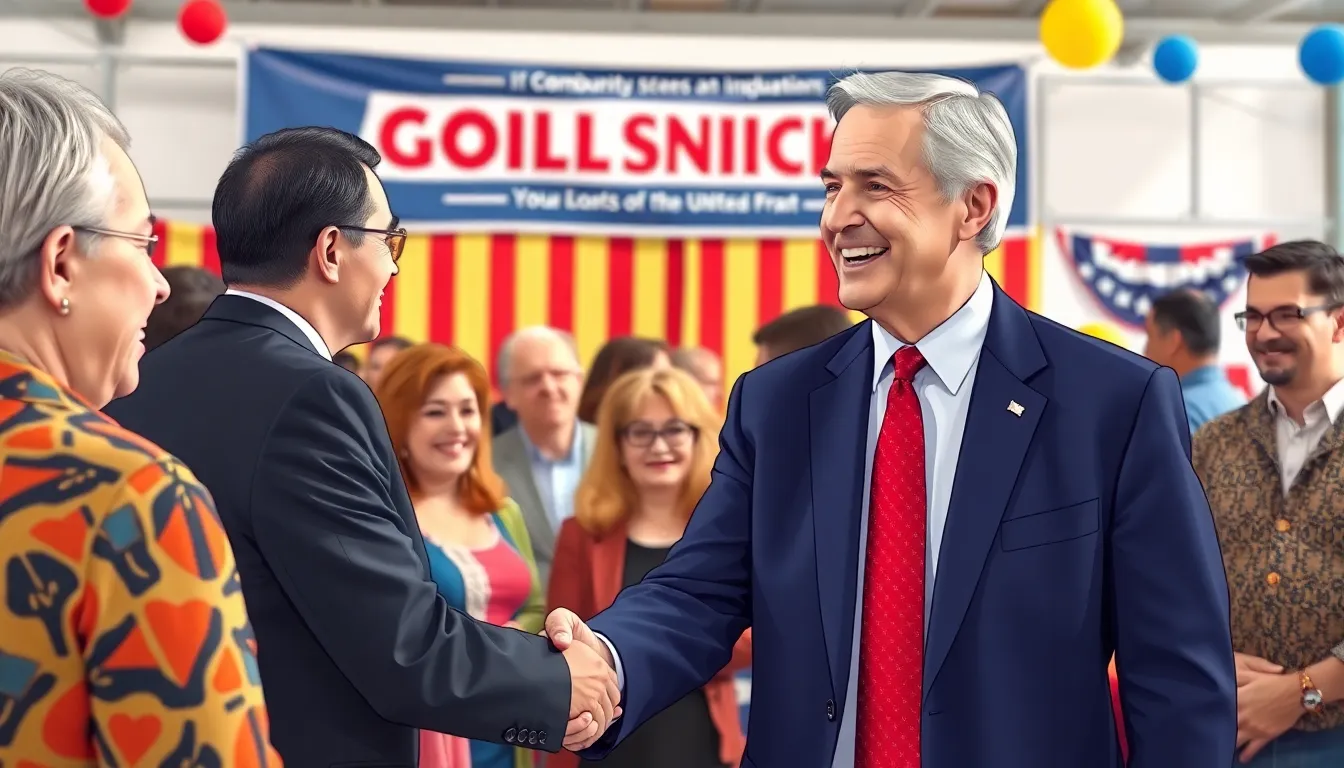
Retail Politics: How Personal Connections Drive Voter Engagement and Election Success
In the bustling world of retail, where every product vies for attention, a different kind of competition unfolds—retail politics. Picture it: savvy politicians maneuvering through the aisles, not just to win votes but to win hearts and minds. They’re not just selling policies; they’re selling themselves, and trust us, it’s a spectacle worth watching.
Retail Politics
Retail politics involves an approach where politicians focus on direct interactions with voters. Engaging in face-to-face conversations allows candidates to understand constituents’ concerns better. This hands-on method often includes attending community events, visiting local businesses, and participating in town hall meetings. Personal connections play a vital role in fostering trust and loyalty among voters.
Strategically, candidates choose locations that resonate with their target audience. Shopping streets, markets, and neighborhoods serve as effective backdrops for these interactions. The theatrical nature of retail politics helps create memorable encounters, turning routine events into captivating experiences.
Voter engagement activities often include discussions about pressing local issues. Candidates use these opportunities to showcase their understanding of the electorate’s needs. Authenticity becomes essential as voters seek genuine connections with politicians.
Polling data highlights that personal interactions positively influence voter turnout and preferences. Research indicates that candidates who actively engage in retail politics see higher success rates at the polls. This phenomenon confirms the importance of building rapport at the grassroots level.
Additionally, retail politics adapts to technological advances. Social media platforms complement in-person engagements, allowing candidates to maintain ongoing dialogues with voters. Integrating digital strategies with traditional methods enhances outreach efforts.
Ultimately, retail politics embodies the essence of candidate-voter relationships. Successfully navigating this landscape requires a thoughtful balance of personal interaction and strategic communication. Each engagement contributes to shaping public perception and electoral outcomes, emphasizing the crucial role of relatability.
Key Features of Retail Politics

Retail politics thrives on personal connections and strategic communication with voters. This approach centers on creating relationships that foster trust and loyalty, essential for electoral success.
Personalization and Relationship Building
Personalization plays a crucial role in retail politics. Candidates prioritize individual interactions, engaging in meaningful conversations that address constituents’ specific concerns. Attending local events presents opportunities for candidates to showcase their understanding of community needs. Building rapport through consistent presence deepens connections. Politicians craft tailored messages to resonate with various demographic groups. Authenticity shines through in these interactions, reinforcing voters’ perceptions of the candidate’s integrity.
Targeted Communication Strategies
Targeted communication strategies enhance the effectiveness of retail politics. Candidates develop tailored messaging that speaks directly to voters’ interests and issues. Utilizing data analytics, campaigns identify key demographics and their pressing concerns. Direct mail, social media, and community outreach allows candidates to engage constituents meaningfully. Feedback from personal interactions informs adjustments to communication tactics, ensuring relevance. Analyzing polling data provides insights into voter sentiments, helping campaigns align their strategies with constituents’ preferences.
The Role of Retail Politics in Elections
Retail politics plays a crucial role in contemporary elections, emphasizing personal connections between candidates and voters.
Case Studies of Successful Retail Politics
Successful instances of retail politics abound in U.S. elections. Barack Obama’s 2008 campaign utilized grassroots efforts, focusing on individual interactions and community events to mobilize voters. The campaign actively engaged young voters, turning them into a vital support base. Another example is Alexandria Ocasio-Cortez, who capitalized on direct outreach in her New York district, connecting with constituents through door-to-door canvassing. Her distinct approach resonated with voters looking for authenticity in representation. These case studies highlight how tailored strategies in retail politics can drastically influence electoral outcomes.
Impact on Voter Engagement
Voter engagement benefits significantly from retail politics. Candidates who prioritize face-to-face interactions generally see increased voter turnout. Recent polling indicates that candidates engaging directly with the electorate build meaningful relationships, leading to higher preferences at the polls. Attending local events, such as fairs or town halls, fosters a connection that resonates with constituents. In addition, understanding local issues enhances candidates’ credibility. As a result, retail politics not only drives voter engagement but also cultivates loyalty, creating a lasting impact on electoral success.
Challenges in Retail Politics
Retail politics presents several challenges that candidates must overcome to effectively engage voters. Maintaining consistency and authenticity forms the bedrock of effective campaigning in this environment.
Maintaining Consistency and Authenticity
Candidates face pressure to present a coherent message that aligns with their values. Inconsistencies can lead to mistrust among constituents. Authenticity remains crucial, as voters resonate more with genuine interactions. Candidates often personalize their approach to foster connections. By showcasing real experiences and addressing local issues, they enhance their credibility. Engaging in community events helps to maintain this personal touch and fosters lasting relationships. Voter perceptions significantly shift when candidates appear relatable, creating an environment where trust leads to electoral success.
Navigating Diverse Voter Needs
Navigating diverse voter needs poses another significant challenge for candidates. Each demographic group holds distinct concerns that require tailored approaches. Comprehensive data analysis aids candidates in identifying these varying needs. They often prioritize outreach strategies that resonate with specific groups to ensure engagement. Employing targeted communication channels, such as social media and direct mail, becomes essential for addressing these differences. Flexibility in messaging allows candidates to adapt their approach based on feedback. Successful candidates demonstrate an understanding of local priorities, making informed decisions that resonate with their constituents. By addressing these diverse needs effectively, candidates enhance their chances of electoral success.
Future Trends in Retail Politics
Technology continues to shape retail politics, enhancing voter engagement through digital channels. Candidates leverage data analytics to target specific demographic groups effectively. Social media plays a pivotal role, allowing for real-time communication and feedback from constituents.
Authenticity remains essential. Voters increasingly prefer candidates who demonstrate genuine concern for local issues. Tailored messaging resonates more deeply when it addresses individuals’ unique experiences.
Experiences at community events evolve as candidates embrace hybrid models of interaction. These hybrids combine in-person presence with virtual town halls, expanding outreach beyond traditional limits. Increasingly, campaigns utilize live streaming to bring discussions directly into homes.
Environmental concerns also rise to prominence. Candidates now advocate for sustainability initiatives, aligning with voters’ growing emphasis on environmental issues. Aligning campaign messages with these values fosters stronger connections with constituents.
Collaboration with local organizations presents another avenue for engagement. Partnerships with community leaders enhance credibility and strengthen candidates’ ties to the electorate. Involvement in local initiatives showcases candidates’ commitment to shared values and goals.
Campaign strategies focus increasingly on grassroots mobilization. Engaging volunteers and community members generates a sense of ownership over electoral processes. Such approaches prove effective in building loyalty and mobilizing support on election day.
Data-driven insights inform outreach techniques, offering candidates the ability to adapt tactics based on voter response. Analyzing polling data helps candidates refine their messaging to enhance resonance. Clarity in communication ensures voters feel informed and involved, boosting overall participation.
Voter interaction methods also diversify as candidates explore innovative approaches. Combining traditional retail politics with emerging technologies presents unique opportunities for engagement. The landscape of retail politics continually evolves, reflecting shifting voter expectations and the dynamic nature of political discourse.
Conclusion
Retail politics stands as a vital component of modern electoral strategies. It emphasizes the importance of personal connections and authentic interactions between candidates and voters. By engaging directly with constituents, candidates can foster trust and loyalty, which are crucial for electoral success.
As technology continues to evolve, so too does the landscape of retail politics. Candidates must adapt their approaches to include digital platforms while maintaining the authenticity that voters crave. The future of voter engagement lies in blending traditional methods with innovative strategies, ensuring that candidates remain responsive to the diverse needs of their communities.
Ultimately, retail politics not only shapes individual campaigns but also influences the broader political discourse, creating a more engaged and informed electorate.
